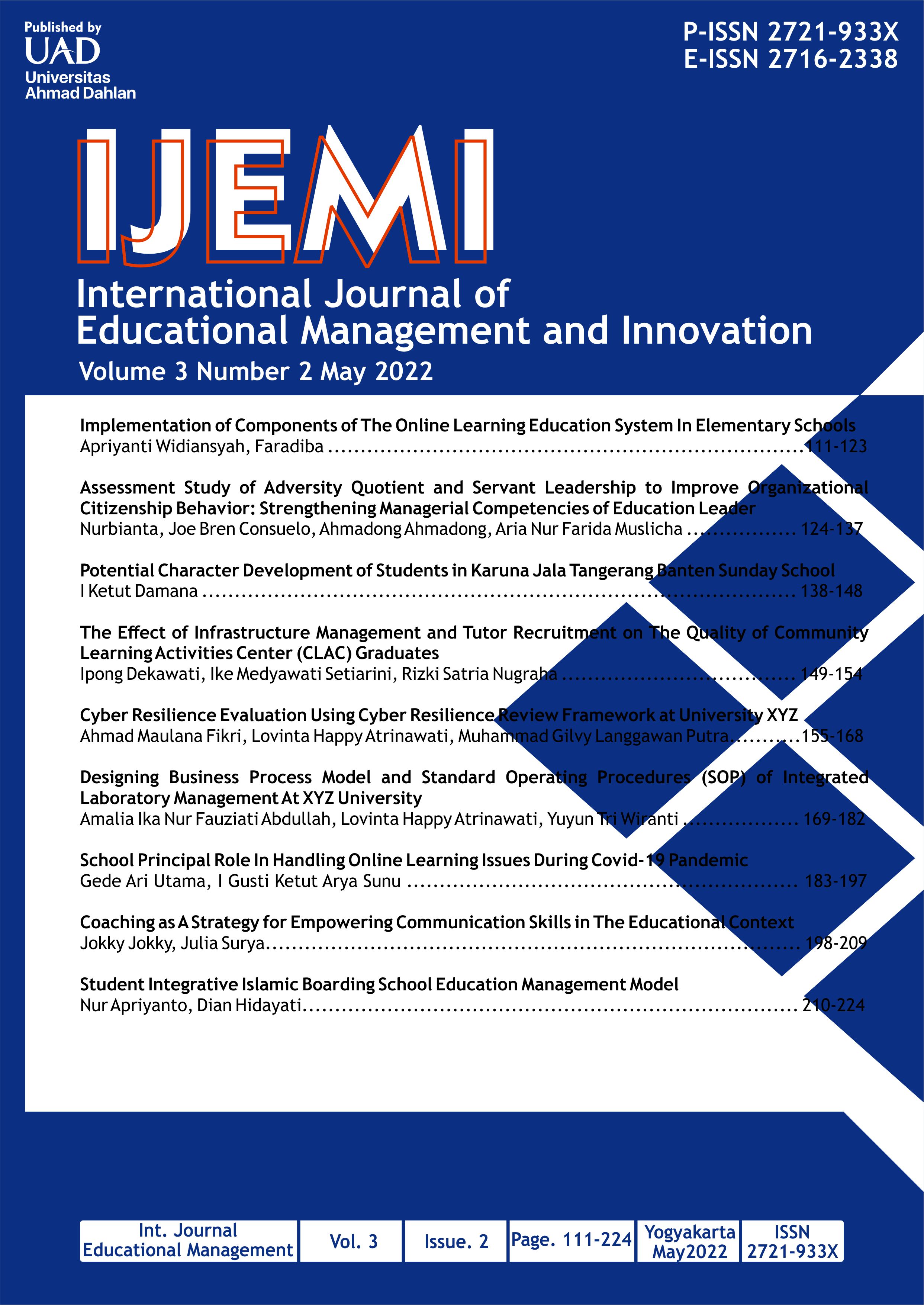Student Integrative Islamic Boarding School Education Management Model
DOI:
https://doi.org/10.12928/ijemi.v3i2.5804Keywords:
Higher Education, Integrated, PesantrenAbstract
The rapid development of higher education if not balanced with an intense spirituality, will be dangerous. Higher education integrated with pesantren attempts to balance technological progress and spiritual strength. Pesantren integrated with universities as part of the modern world and proved that the pesantren program is no longer considered old and backward. The existence of tertiary institutions that integrate pesantren is a form of public service in responding to various challenges in implementing education in Indonesia in a complete and balanced form between character and cognitive. The research method used to describe the integrity management model of pesantren education for students in Yogyakarta is qualitative descriptive with Data collection techniques in interviews, documentation, and observation. This study shows that: (1) The integration model of universities and pesantren in Yogyakarta is not carried out in one model. (2) Management of Islamic boarding school education carried out by the Tarbiyah Madani School of Science is linear integration management. (3) Educational Management Islamic boarding school conducted by Stikes Surya Global is a non-linear, fully integrated management type. (4) Management of Islamic boarding schools carried out by Unires Universitas Muhammadiyah Yogyakarta is a type of partial integration management (5) In implementing the management of Islamic boarding schools, Students in Yogyakarta are seen using good modern management. (6) Management of islamic boarding school students shows professional and accountable management in all elements.
References
Ag, M., & Miftahuddin, H. (2020). Model-Model Integrasi Ilmu Perguruan Tinggi Keagamaan
Anindita, H. (2020). Pengaruh Kepribadian Proaktif, Kinerja Kerja, Dan Promosi Diri Terhadap Kesuksesan Karir Karyawan Pada Pondok Pesantren Mahasiswa Stikes Surya Global Yogyakarta.
Astuti, A. P., Aziz, A., Sumarti, S. S., & Bharati, D. A. L. (2019). Preparing 21st-century teachers: implementation of 4C character's pre-service teacher through teaching practice. Journal of Physics: Conference Series, 1233(1), 12109.
Furchan, A., & Maimun, A. (2005). Pengembangan Kurikulum Berbasis Kompetensi di Perguruan Tinggi Agama Islam.
Islam (Studi Multi Situs pada UIN Jakarta, UIN Yogyakarta, dan UIN Malang). IAIN SALATIGA.
Khoiriyah, B. (2021). Model Integrasi Keilmuan Pesantren pada Pendidikan Tinggi Keagamaan Islam di Indonesia. Institut PTIQ Jakarta.
Khoiruddin, M. (2018). Pendidikan Sosial Berbasis Tauhid dalam Perspektif Al-Qur’an. Aplikasia: Jurnal Aplikasi Ilmu-Ilmu Agama, 18(1), 51–61.
Latham, G. P., Almost, J., Mann, S., & Moore, C. (2005). New developments in performance management. Organizational Dynamics, 34(1), 77–87.
Ma’ruf, S. (2021). KORELASI KEMAMPUAN MEMBACA AL-QUR’AN DENGAN KEMAMPUAN MAHARAH QIRO’AH (STUDI KASUS: RESIDEN UNIRES UNIVERSITAS MUHAMMADIYAH YOGYAKARTA) TAHUN AJARAN 2020/2021. Universitas Muhammadiyah Yogyakarta.
Miftah, M. (2017). Model Integrasi Sains dan Agama dalam Pendidikan Nasional. Jurnal Penelitian, 14(2), 233–246.
Prabowo, S. L. (2009). Penjaminan mutu dengan sistem manajemen mutu ISO 9001: 2000 di perguruan tinggi (studi multi situs pada STIE Malangkucecwara Malang dan Universitas Narotama Surabaya). Universitas Negeri Malang.
Primayana, K. H. (2016). Manajemen Sumber Daya Manusia Dalam Peningkatan Mutu Pendidikan Di Perguruan Tinggi. Jurnal Penjaminan Mutu, 1(2), 7–15.
PUTRA, I. P. (2017). SISTEM INFORMASI PENGELOLAAN SANTRI PONDOK PESANTREN MAHASISWA ARROYYAN BAITUL HAMDI YOGYAKARTA. Universitas Gadjah Mada.
Rapono, M. (2020). UIN-IAIN-STAIN: Perkembangan Epistemologi dan Institusi Perguruan Tinggi Islam Indonesia. TAZKIYA, 8(2).
Rohiat, R., & Pd, M. (2010). Manajemen sekolah: Teori dasar dan praktik. Bandung: Refika Aditama.
Shiddiq, A. (2015). Tradisi Akademik Pesantren. TADRIS: Jurnal Pendidikan Islam, 10(2), 218–229.
Sugiyono, D. (2013). Metode penelitian pendidikan pendekatan kuantitatif, kualitatif dan R&D.
Suprayogo, I. (2017). Membangun Integrasi Ilmu dan Agama: Pengalaman UIN Maulana Malik Ibrahim Malang. Proceeding IAIN Batusangkar, 1(1), 27–46.
Tholkhah, I., & Barizi, A. (2004). Membuka Jendela Pendidikan: mengurai akar tradisi dan integrasi keilmuan pendidikan islam/Imam Tolkhah.
Zainiyati, H. S. (2014). Model Kurikulum Integratif Pesantren Mahasiswa dan UIN Maliki Malang. Ulumuna, 18(1), 139–158.
Downloads
Published
How to Cite
Issue
Section
License
Copyright (c) 2022 Universitas Ahmad Dahlan

This work is licensed under a Creative Commons Attribution-ShareAlike 4.0 International License.
The copyright to this article is transferred to Universitas Ahmad Dahlan (UAD) if and when the article is accepted for publication. The undersigned hereby transfers any rights in and to the paper including without limitation all copyrights to UAD. The undersigned hereby represents and warrants that the paper is original and that he/she is the author of the paper, except for material that is identified as to its source, with permission notices from the copyright owners where required. The undersigned represents that he/she has the power and authority to make and execute this assignment.
We declare that:
This paper has not been published in the same form elsewhere.
It will not be submitted anywhere else for publication before acceptance/rejection by this Journal.
Copyright permission is obtained for materials published elsewhere and which require this permission for reproduction.
Furthermore, I/We hereby transfer the unlimited rights of publication of the above-mentioned paper in whole to UAD. The copyright transfer covers the exclusive right to reproduce and distribute the article, including reprints, translations, photographic reproductions, microform, electronic form (offline, online), or any other reproductions of similar nature.
The corresponding author signs for and accepts responsibility for releasing this material on behalf of any and all co-authors. This agreement is to be signed by at least one of the authors who have obtained the assent of the co-author(s) where applicable. After submission of this agreement signed by the corresponding author, changes of authorship or in the order of the authors listed will not be accepted.
Retained Rights/Terms and Conditions
Authors retain all proprietary rights in any process, procedure, or article of manufacture described in the Work.
Authors may reproduce or authorize others to reproduce the Work or derivative works for the authors' personal use or for company use, provided that the source and the UAD copyright notice are indicated, the copies are not used in any way that implies UAD endorsement of a product or service of any employer, and the copies themselves are not offered for sale.
Although authors are permitted to re-use all or portions of the Work in other works, this does not include granting third-party requests for reprinting, republishing, or other types of re-use.




